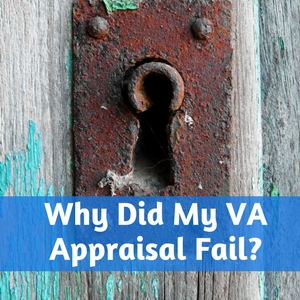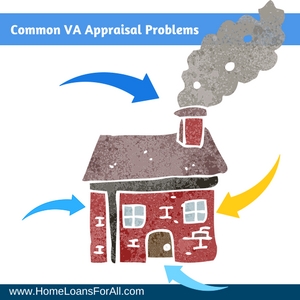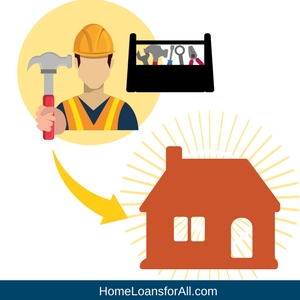Purchasing a new home with a VA loan requires your home to pass the appraisal process instead of falling victim to some of the common VA appraisal problems. Unfortunately, not every property will be able to adhere to the stringent guidelines set out by the program.
This can be easily avoided by selecting a safe property, but it also helps if potential homebuyers can anticipate some of these common VA appraisal problems during their shopping period.
You Might Already Be Pre-Qualified For A VA Loan In Your State – Click Here!
 The Department of Veterans Affairs (VA) agrees to back a portion of every loan using federal funding. Their guarantee makes private lenders more likely to issue loans with more favorable terms and financially advantageous features to veterans and active duty service members.
The Department of Veterans Affairs (VA) agrees to back a portion of every loan using federal funding. Their guarantee makes private lenders more likely to issue loans with more favorable terms and financially advantageous features to veterans and active duty service members.
Because the government is agreeing to back these mortgages, they also want to ensure that their own interests in the property are protected by the VA appraisal process.
In a VA appraisal, a third-party inspector is hired by the government to take a look at a prospective property for home buyers. This person is checking to ensure that the home meets the minimum property requirements that make it safe and sanitary for veterans to live in long-term.
A home that fails to meet the requirements according to the appraiser’s findings will no longer be eligible for the VA home loan until those issues are corrected.
What Are the Common VA Appraisal Problems?
Every property that is purchased using a VA home loan must meet certain minimum property requirements (MPRs). These items ultimately comprise the VA appraisal checklist.
These are qualities that prove that the home is safe and sanitary for a veteran to live in. While it may seem like a few of these characteristics are relatively arbitrary, homebuyers should actually be grateful they exist. This is the government’s way of helping to protect homeowners from purchasing a house that could potentially be a money pit or unfit for veterans to live in.
Some of the minimum property requirements are relatively easy to guess: the home must have no obvious safety issues, have adequate living space, must be zoned for residential use, and essential systems must be in great working order. For a more extensive list of the MPRs that an appraiser will be looking for, see the list below:

- Adequate heating
- No electrical or plumbing problems
- Clean drinking water
- No roof issues
- No lead paints
- No termite or pest infestations
- No obvious issues with the infrastructure or defective construction
- Property accessibility
Within each of these categories, there are a few common VA appraisal problems that homeowners face. For more information on what issues could jeopardize your funding, you can see the breakdown of some of these common issues below.
Common VA Appraisal Problems
Mold and Mildew: Mold can be particularly hazardous to your health, even with just short-term exposure. The VA appraiser is going to be keeping an eye out for any mold spores or mildew growth that could the sign of a much larger moisture issue.
Exposed Wires: Have you ever looked at a home that had bare wires and felt good about the state of its electrical system? Most appraisers and inspectors will immediately flag a home that shows signs of electrical disarray. These issues can be extremely expensive to repair and could lead to major issues like fires.
Check around, particularly near the breaker box, to make sure nothing stands out to you or you could be facing one of these common VA appraisal problems.
Windows: Windows are an important part of a home because they allow ventilation and serve as a secondary means of escape during emergencies. Perhaps this is why appraisers will be checking to ensure that they are all in fully operable condition.
They should be able to open and the panes should be free of major cracks or chips. A missing pane will definitely raise some red flags for an appraiser. This is an item you can investigate before you ever even complete a walkthrough of the home to help you avoid this common issue.
Insufficient HVAC: Not all areas are required to maintain both heating and air conditioning. However, heating is a priority and a must-have feature in every home. Even if you don’t feel like the heat is completely necessary, a non-functioning furnace will derail a VA appraisal.
This prevents you from being able to maintain a comfortable living condition in the event of a winter disaster.
Roofing Problems: Did you notice that steady drip that comes straight from the ceiling? Whether you can tell there are shingles loose or you can see the beginning of a major roof leak, a VA appraiser is going to take a relatively thorough look at the roof.
After all, this is what protects the entire home from the elements and windy weather. If you see a roof problem, it is most likely going to need to be corrected before you can close on the home.
What Should I Do if the Home Fails the VA Appraisal?
 If the home fails the VA appraisal, that doesn’t necessarily mean that all hope is lost. You have a few alternative options to secure the funding you need to make the home your own.
If the home fails the VA appraisal, that doesn’t necessarily mean that all hope is lost. You have a few alternative options to secure the funding you need to make the home your own.
However, you will have to ensure that any issues raised by the appraiser are corrected before the lender is going to issue the financing you need to purchase the property.
You can definitely request that the seller make the necessary repairs before you’re willing to close on the property. Some sellers are more than willing to make the much-needed repairs in order to secure a buyer for their home. However, others may still hold out hope that they can sell the home without sinking another penny into its cost and maintenance.
If this describes your seller, you might choose to pay for the cost of the repairs yourself. This is a risky endeavor because you will be putting money into a home that you do not yet own.
Using this method, you can ensure that the home receives the repairs it needs from a contractor of your own choosing while still securing your financing. Unfortunately, these funds must be paid for upfront without the ability to bundle them into your principal loan balance. This isn’t a financial possibility for many prospective home buyers.
If the property simply doesn’t appraise for the value of the sale price, you can ask for a Reconsideration of Value and challenge the VA appraisal. It is possible that the appraiser either made a mistake on the square footage of the home or didn’t account for any recent upgrades to the property.
In other situations, they may not have used truly comparable real estate listings to make their comparison for value. For more information on how to challenge a VA appraisal, you can see our article on it here.
Last but not least, you can choose to walk away from the property altogether. If your appraiser identified a lot of major issues that will come with a significant repair bill, you might want to consider whether you can afford to repair and maintain this property long-term.
More repairs might be coming after you finish covering the cost of these, and that is just to meet the minimum property requirements. Walking away could save you more in the long run.
Conclusion
The VA appraisal process exists to help protect veterans from purchasing homes that will cost them a small fortune in repairs. While there are quite a few standards set in order for a home to meet the minimum property requirements on the VA appraisal checklist, they are all ultimately in the best interest of the veteran purchasing the home.
If you encounter any of these common VA appraisal problems, your financing is likely to be derailed until you can have them remedied.
The solution to your common VA appraisal problems may not always be entirely clear. You will have to weigh all of the options based on the issues at hand before you make a decision. Be sure to talk with your lender about any of these issues that might show up on your upcoming appraisal.
Frequently Asked Questions
How long does it take for my VA appraisal to come back?
It should take approximately ten business days or less to put together the full report from your VA appraisal. It may take longer in areas that have fewer independent inspectors to complete the task.
How much does a VA appraisal cost?
A VA appraisal is the responsibility of the buyer and it usually costs between $300 and $500.
How much does it cost to challenge a VA appraisal?
There is no cost to challenge a VA appraisal. This is simply a review of the previous appraisal alongside any new or differing data from the first visit. Unless there is a request for an increase of 10 percent value or more, there is no need for an additional walkthrough.











